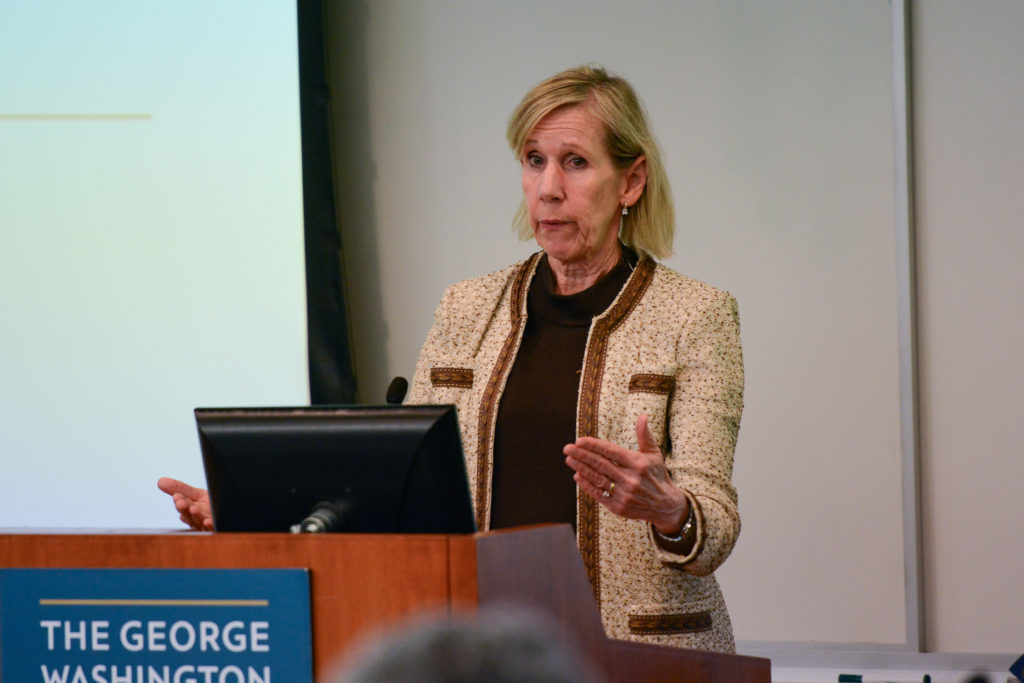Updated: May 23, 2017 at 11:00 a.m.
Officials are convening a faculty advisory group to focus on keeping students at GW.
The committee, known as the Faculty Advisory Support Team, will explore new strategies and programs for teaching, learning and boosting the University’s retention rate – the percentage of students who remain at and graduate from GW – and is scheduled to begin meeting next fall, Geneva Henry, dean of libraries and academic innovation, said at a Faculty Senate meeting earlier this month.
“It really is to make sure that we are fully aware of faculty concerns and faculty issues with online teaching and student performance, and that they are aware of issues that are popping up that they might really need to know about and that they can engage with,” she said.
Henry said that the group would be separate from the standing committees of the Faculty Senate in order to remain “lightweight” and stay on task, but would have representatives from all the schools, except the nursing school and law school.
Invitations to the advisory group have been sent to all schools at the University and the department is awaiting responses, she said.
Officials have made increasing the University’s retention rate a central focus in recent years.
The University’s freshmen retention rate, which has held steady around 90 percent the last several years, and the six-year graduation rate, which increased to about 84 percent this year, remain well above the national average, but they have lagged behind some peer institutions.
Officials created a position last spring to specifically address retention, hiring Oliver Street as the University’s first executive director of enrollment retention last summer.
In a presentation before the Faculty Senate, Henry highlighted a study from a researcher in Nevada that found more transparency and clarity from professors in their course assignments can help improve retention. She cited the study as an example of the kind of projects and reform the advisory board would explore to boost retention.
“Something as simple as having somebody else look at an assignment and saying ‘is this clear?’ is making a difference in the retention and students being able to perform better in the classroom,” she said.
Robert Donaldson, a professor of biology and a member of the University Teaching and Learning Center’s advisory committee, said the group would be a good way for faculty to use their expertise to develop new strategies to boost retention.
“There needs to be attention in terms of supporting students effectively to allow them to succeed,” he said.
He said the advisory group could consider initiatives implemented at other universities like the undergraduate learning assistants program, which trains students to help their peers through class assignments.
“It sounds like a good idea that the Teaching and Learning Center would have access to more faculty input, and I imagine that would involve being a conduit to bring in research and best practices from other institutions,” Donaldson said.
Some faculty were frustrated that the advisory group was formed without first alerting the Faculty Senate, which has also focused on student retention in recent years.
Marie Price, a professor of geography and a member of the senate’s educational policy committee, said the committee would be a good way to improve faculty conduct to ensure that students feel comfortable and supported on campus. But she said the committee needed to avoid doing the same type of work as other committees.
“Ideally, a committee like that shouldn’t be stand alone, but it should be talking to committees in the senate that are dealing with similar issues,” she said.
Price said it’s important to have faculty advise the library and academic innovation department because of many of its programs, like the University Writing Center and the STEMworks lab, directly impact the work of students and faculty on campus.
“The library has really transformed,” she said. “Geneva has a really encompassing view of the library as a dynamic center for research and improving the pedagogy and outcome for our students.”
Harald Griesshammer, an assistant professor of physics and chair of the senate’s research committee, said it was a violation of the faculty code for Henry to create the task force without first consulting faculty. He sent an email to Henry last Tuesday outlining his position and asking her to remedy the situation.
He said Henry responded but he declined to discuss the details of their conversation.
“Dr. Henry has no choice but to take the time to set things right and first consult with the appropriate faculty representatives,” he said. “She may have to start all over again.”
This post was updated to reflect the following correction:
The Hatchet incorrectly referred to the advisory board as a task force and a committee. It is not either because the group will not have governing authority. We regret this error.





